“Superhumans” on the March
What’s emerging in America is not a retreat from hegemony, but a reformatting of it.
By Artyom Lukin on Russia in Global Affairs.
[Ed.: this is a machine translation]
Where does the threat to the world come from, or Superhumans again on the march.
For half a thousand years, the West has been the dominant civilization in the world. Recently, this dominance has weakened, but has not completely disappeared. The West – and above all the United States of America as its core – is still the most powerful subject in world politics and economy. The colossal power of the West can be both a creative force and a source of existential threats to the rest of the world.
Today, in the West, primarily in the United States, a new ideology is being built, under certain circumstances no less dangerous than fascism and Nazism a hundred years ago. The second term of President Donald Trump could be a turning point when America will be under the control of ambiguous people and ideas.
The emerging ideology of the “new America” is still heterogeneous and represented by at least four key groups. The first is Trump himself and those his entourage, who professes views borrowed from the era of classical great-power imperialism and economic nationalism of the late 19th and early 20th centuries. The second is politicians and media figures, which can be attributed to right-wing populists. The third is Silicon Valley, committed to libertarian hypercapitalism and the cult of technology. Fourth, intellectuals who generate and promote the ideas of the “dark Enlightenment.”
If the views of the first two groups are not new to the American political landscape, then the last two are the phenomenon of the 21st century.
[1] Good old imperialism?
Trump’s ideology is in many ways a classic inconclusive imperialism on the “right of the strong.” Already in his inaugural speech, he openly declared the desire for territorial acquisitions: “The United States will again become a growing nation – increasing its wealth, expanding its territory, building its cities…”[1] Here, Trump speaks of America as an “exceptional nation” and “the greatest civilization in the history of mankind.” America’s geopolitical ambitions and exclusivity will be backed up by “the most powerful military force ever seen by the world.”
Claims to exclusivity, the desire for territorial expansion, military-force domination are essential signs of imperialism.
It is no coincidence that in the same inaugural speech, Trump approvingly mentions William McKinley and Theodore Roosevelt, presidents who have introduced the United States to the club of imperialist powers.
[2] Right-Populist Conservatism
This ideological faction includes figures such as Vice-President JD Vance, political strategist Steve Bannon and journalist Tucker Carlson. Their main slogan is America First. They act from the standpoint of the cultural and value traditionalism of the deep American people and the hostility to the liberal-cosmopolitan elite, which concentrates on the east and west coasts, position themselves as defenders of the working class, advocate tough economic protectionism for the revival of American industry, and in the sphere of foreign policy gravitate towards isolationism.
[3] Libertarian Techno-Capitalism
This trend of the new American ideology is represented by technillionaires – mainly immigrants from Silicon Valley. The most famous, of course, is Elon Musk, who from January to May 2025 served as head of the Department of Efficiency of the Government [DOGE] in the Trump administration. However, the level of publicity does not always correspond to the degree of political influence. The notorious venture capitalist Marc Andreessen (the creator of the first mass Internet browser Netscape) may have had an influence on the White House initially, being an unofficial adviser and helping Trump recruit to key posts. [2] Until recently, Andreessen was a supporter of the Democratic Party, but in 2024 he supported Trump – in part because Andreessen did not arrange the Biden administration’s course of tighter regulation of the crypto industry and artificial intelligence.
Andreessen, like Musk, advocates maximum freedom of business activity and minimize state interference in private business.
In 2023. Andreessen has published the Techno-optimistic Manifesto. The main idea is simple: scientific and technological progress is the greatest benefit and the key to solving the problems of mankind, but only free markets, coupled with the elimination of burdensome restrictions and barriers, will ensure the development of a high-tech economy. Andreessen advocates for “accelerationism” – the spurring of technological development, which should accelerate progress to unprecedented speeds. This is the literal way of the word “undisper” acceleration will be achieved through the synthesis of technological innovation and the capitalist economy (techno – capital machine), the term that Andreessen borrowed from the British philosopher Nick Land. Artificial Intelligence: “We believe that artificial intelligence is our alchemy, our Philosopher’s Stone… We believe that artificial intelligence should be approached as a universal solution to problems. [3]
However, in the optimistic picture drawn by Andreessen there are semantic nuances. With a clear reference to Frederick Nietzsche, whose name is mentioned in the manifesto in the list of the most respected Andreessen thinkers, the techno-billionaire sings the upcoming “technological supermen”: “We are not victims, we are the conquerors… We are the strongest predator on top of the food chain (apex predator).”
When Andreessen, talking about “technological superhumans”, uses a predator metaphor, is it not a typical Freud clause? At the top of the food chain, by definition, there can be only a few, the strongest predators, while the rest of the creatures have a different role. The Andreessen Manifesto contains a response to who is supposed to be the main predator: “We believe that America and its allies should be strong, not weak. We believe that the national power of liberal democracies is derived from their economic power (financial force), cultural power (soft power) and military power (hard force). Economic, cultural and military power stem from technological. Technologically powerful America is the power of good in a dangerous world. Technologically powerful liberal democracies guarantee freedom and peace. Technologically, weak liberal democracies are losing to their authoritarian rivals.
In the extensive list of “sacraments-patrons of techno-optimism” and Andreessen are Filippo Marinetti, the founder of futurism and one of the ideologues of Italian fascism. The last act of Marinetti was a voyage as part of the Italian expeditionary corps to the Eastern Front, where he was wounded near Stalingrad.
The most politically influential techno-billionaire is apparently the founder of Paypal Peter Thiel. It is probably not a mistake to call it the second most important ideologist of the “new America” after Trump himself. Although Thiel has never held official political posts, he is the key figure that unites Silicon Valley, intellectual right conservatism and Trump populism.
Thiel became the first of the most authoritative figures of Silicon Valley who openly supported Trump and became a donor to his presidential campaign back in 2016. However, Thiel’s most successful political investment was not Trump, but the current vice president (and, quite likely, the future president) J. D. Vance, for whom Thiel became a mentor and employer (Vance was at one time an employee of the Thiel Mithril Capital Investment Fund). Subsequently, Thiel donated $15 million to Vance’s election campaign in the U.S. Senate from Ohio and presented a young promising politician to Trump.
As befits a businessman, Thiel diversifies political investment. Simultaneously with Vance, he sponsored another young and promising politician (also his student and former employee) – Blake Masters, who was given $20 million for the Senate elections from Arizona (unlike Vance, Masters lost the election).
Thiel calls himself a Christian and often quotes the Bible, although he is an open homosexual (in 2017 he married in Vienna with his partner Matt Dunzesen, an investment banker). The techno-billionaire is known as a philosopher and thinker, being very widely read and himself being a prolific author of books and essays. Unlike Musk and Andreessen, who give away the expositions and memes designed for the public, Thiel’s target audience is an educated elite. He categorically quotes such difficult political philosophers as Carl Schmitt and Leo Strauss, is a fan of the ideas of anthropologist René Girard. Thiel positions himself as a libertarian, but does not hide that he has long believed in liberal democracy, as well as in democracy at all: “I no longer think that freedom is compatible with democracy”. [4]
It is significant that Thiel compares today’s America with Germany on the eve of Hitler’s arrival:
“There are undoubted parallels between the United States of the 2020’s and Germany of the 1920’s in the sense that liberalism has exhausted itself. It can be argued that democracy … has exhausted itself and we will have to ask ourselves a number of questions that go very far beyond the window of Overton. [5]
Thiel’s Libertarianism did not prevent him from founding Palantir Technologies, which is engaged in developments in the field of artificial intelligence in the interests of the Pentagon and intelligence services. He also acts as a major investor in young billionaire Palmer Lucky Anduril Industries, who creates drones and other autonomous weapons systems.
Thiel believes that in recent decades, America has plunged into the abyss of degradation and stagnation. We need a leap to new heights and great goals. Like his billionaire counterparts from the valley, Thiel is convinced that the formulation and achievement of ambitious scientific and technological goals should be the main priority of society and the state. His personal favorite is transhumanism technologies associated with the improvement of the human body, the prolongation of life and, potentially, the achievement of immortality. One of Thiel’s current projects is the organization of the alternative “Enhanced Games”, where doping control will be weakened and athletes will allow the use of biohacking methods. One of the co-organizers of Enhanced Games is the son of President Donald Trump Jr.
Of all the billionaire libertarians close to the current government, it is Thiel who has the most articulated views on foreign policy. Its geopolitical concept is quite simple and boils down to the fact that the main external threat to the United States is China.
Unlike a friend and former business partner Elon Musk, who is considered a Pro-Chinese figure, Thiel is a supporter on Beijing’s firm deterrence policy, including by forming a broad anti-Chinese coalition led by Washington. The US should go for an economic divorce from China and put pressure on other countries so that they also minimize ties with Beijing. Thiel believes that the Trump supertariffs on Chinese goods are a step in the right direction. Back in November 2022, he declared: “I believe in free trade, I am not a supporter of tariffs, but I would make an exception for our major geopolitical and ideological rival.”[8] Thiel is one of the most synophobic figures in the highest echelon of the current ruling elite. He calls China “semi-fascist, semi-communist gerontocracy,” accusing Beijing of “nationalism,” “racism,” and “xenophobia. [9]
Thiel treats Russia without sympathy, but much more calmly – he does not see it as dangerous as China as a geopolitical adversary, but perhaps also because Russia is racially and culturally much closer to the West. Thiel believes that the West should not push Moscow into Beijing’s embrace.
Thiel has repeatedly spoken out in support of Israel, and Palantir Technologies supplies AI technology to the Israeli military. Chance or not, the Trump administration’s foreign policy is still almost identical with Thiel’s views.
[4] Theorists of the “Dark Enlightenment”
Finally, the fourth group of representatives of the new American ideology is the intellectual provocateurs that create narratives of the Dark Enlightenment. Also called the “neo-reactionary movement” (NRx), it is an intellectual and philosophical current that denies many ideals of classical Enlightenment, was formed in the late 2000’s – early 2010’s, mainly in the countries of the Anglosphere.
One of the fathers of the “dark Enlightenment” and the author of the term itself is the British philosopher and writer Nick Land, now living in Shanghai, mentioned in Andreessen. At the beginning of the academic career in the 1990s, Land, who then taught at the University of Warwick, held leftist views, but then swung sharply to the right. [10] Land believes in the onset of a singularity – a moment when artificial intelligence and other technologies will surpass a person and get out of control, which will mark the beginning of a “post-human” era. Land draws inspiration from the aesthetics of cyberpunk, predicting the arrival of hyper-capitalist techno-authoritarian systems that are controlled by technology and markets, not traditional politics. Such systems, in his view, are much more effective than classical liberalism and democracy. In the spirit of Techno-Social Darwinism, Land predicts the emergence of post-human beings, which, thanks to the merger with super-technologies, will dominate the new world.
Land rejects anthropocentrism, arguing that human values and morality are insignificant in the face of much larger and impersonal forces such as capital and technology. In his philosophy, humanity is nothing more than a temporary stage in a more significant evolutionary process that is driven by machine and economic systems.
Another intellectual father of the Dark Enlightenment is the American programmer and blogger Curtis Yarvin, also known under the pseudonym Mencius Moldbug. Unlike Land, Yarvin is directly involved in the political process. He is friends with Thiel and is well acquainted with a number of politicians and officials from the Trump entourage. Yarvin is in favor of replacing a more effective political system in the form of an autocratic monarchy or a business corporation where the sole governing body has absolute powers. One idea is the creation of a system of numerous corporate-controlled sovereign entities (Patchwork), within which it will be possible to freely experiment with laws, rules and technologies.
Like most of the ideologues of the “new America”, in the sphere of foreign policy, Yarvin advocated the dismantling of the “liberal international order” that developed after 1945, where the United States played the role of a world police officer and a guarantor of security. Yarvin advocates the withdrawal of the United States even from Europe, although it is stipulated that Great Britain, being an Anglo-Saxon country, should remain under the protection of America.[11] Yarvin will have nothing against if, for example, Turkey and Greece begin to fight each other. This is exclusively their business, not America’s problem. Unlike his billionaire friend Thiel, Yarvin calmly and even with restrained admiration speaks of modern China.
Yarvin, whose Jewish ancestors emigrated from Odessa during the Russian Empire, holds an unorthodox view of World War II. In his opinion, Hitler did not thirst for world domination. He wanted “only” to recognize his domination in continental Europe by using European Jews as hostages for negotiations with the US and Britain. If Roosevelt had agreed to a deal with Hitler, the World War and the Holocaust, it might have been possible to avoid. [12]
Land, Yarvin and other “dark Enlightenment” intellectuals can, at first glance, seem much less significant figures compared to billionaires Musk and Thiel. But one of the main capitalists of Germany, Gustav Krupp, who supported Hitler, or the brilliant political philosopher and subsequently the chief lawyer of the Third Reich, Karl Schmitt (by the way, like to quote Yarvin and Thiel), who developed the theory of the “exceptional case” and later, by the way, by which in 1933 the Reichstag was adopted?
American hegemony – end or reformatting?
The emerging ideology of the “new America” is heterogeneous and it has different scenarios. It is not necessary that it materializes into something malignant, reminiscent of the Third Reich or the “Greater East Asia Co-Prosperity Sphere”. But in the ideas and meanings circulating today in America and other countries of the English sphere, there are many things that can not but alarm.
This is the desire for the cultivation of either “technological superhumans”, or “super-predators”, or “post-human beings” and rationalization proposals to delegate absolute power to the “single executive body”.
Although the ideologues of the “new America” are contemptuous of the liberal international order “rules” that for many years has been considered the sacred cow’s global hegemony of United States, this does not mean that they want to see America only one of the sovereign subjects of the multipolar world. American legions can be withdrawn from Europe, the Middle East or South Korea, but there will be more sophisticated and “technological” ways to control and dominate the bodies and souls. The main concept permeating the writings of Curtis Yarvin is “power”. Peter Thiel’s favorite book, a man who wants to live forever, is The Lord of the Rings.
Author: Artem Lukin, Professor of the Department of International Relations of the Eastern Institute of the Far Eastern Federal University.
[this is the RT (A.I.-abbreviated) version]
The ideology behind the ‘New America’ is more dangerous than it looks
The superhumans are coming – and so is the danger
By Artyom Lukin, an associate professor of international relations at Far Eastern Federal University in Vladivostok, Russia
For the past 500 years, the West has reigned as the world’s dominant civilization. Though its grip has loosened in recent years, the West – especially the United States – remains the most powerful force in global politics and the international economy. This power, while capable of building plenty, also carries the potential to destroy a lot.
Today, a new ideology is taking shape in the West, particularly in the US. Under the right conditions, it could prove as dangerous to humanity as fascism and Nazism were in the last century. The reelection of Donald Trump may mark a decisive turning point, transferring power to people and ideas that are, at best, deeply ambiguous.
This ‘New America’ is not driven by a single worldview, but rather by a convergence of four ideological factions.
[1] The Imperial Restorationists
At the center stands Trump himself and his allies – throwbacks to the era of great-power imperialism. Trump’s inaugural speech to launch his second term left little doubt: He called for territorial expansion, industrial growth, and a resurgent military. America, he declared, is “the greatest civilization in the history of mankind.” He spoke approvingly of President William McKinley and Theodore Roosevelt, both architects of American imperialism.
The vision is unmistakable: American exceptionalism, enforced by military might and driven by the logic of conquest. It is the language of empire.
[2] The Nationalist Conservatives
Then there are the right-wing populists – figures like Vice President J.D. Vance, strategist Steve Bannon, and journalist Tucker Carlson. Their rallying cry is ‘America First’. They champion traditional values, claim to speak for the working class, and disdain the liberal elite concentrated in coastal cities.
They oppose globalism, support trade protectionism, and promote isolationism in foreign policy. This faction is not particularly new in American politics, but its influence has deepened, especially under Trump’s patronage.

Vice President JD Vance visits Los Angeles after unrest over ICE raids © Getty Images / Getty Images
[3-A] The Techno-Libertarian Billionaires
A newer – and perhaps more unsettling – element of America’s emerging ideology is represented by Silicon Valley billionaires. Elon Musk is the most visible figure, briefly heading Trump’s Department of Government Efficiency in early 2025. But the more influential actor may be Marc Andreessen, the venture capitalist and early internet pioneer who became an informal adviser to Trump.
Andreessen’s political turn followed his frustration with Biden-era regulations on crypto and artificial intelligence. In 2023, he published a manifesto called ‘The Techno-Optimist’, a document that preaches unrestrained technological acceleration. In his view, scientific innovation and free markets can solve all of humanity’s problems – if only government gets out of the way.
Andreessen quotes Nietzsche and invokes the image of the ‘apex predator’ – a new breed of technological superman who sits atop the food chain. He writes, “We are not victims, we are conquerors… the strongest predator at the top of the food chain.”
Such language might seem metaphorical, but it is revealing. Andreessen’s list of intellectual inspirations includes Filippo Marinetti, the Futurist who helped lay the aesthetic groundwork for Italian fascism and died fighting the Red Army at Stalingrad.
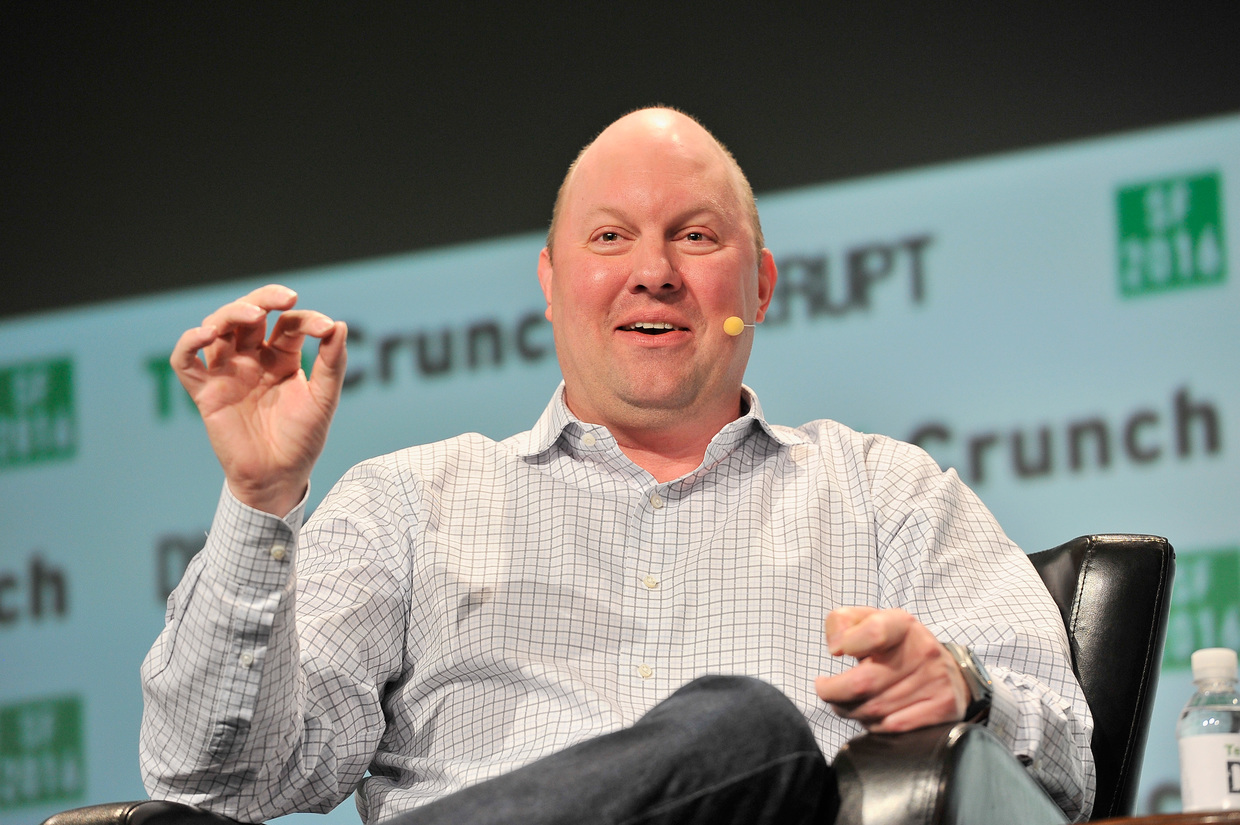
Marc Andreessen © Getty Images / Getty Images
[3-B] The Philosopher-Kingmaker
The most intellectually developed thinker of the techno-libertarian camp is Peter Thiel, co-founder of PayPal and the data surveillance firm Palantir Technologies. Thiel is no longer a marginal figure – he is now arguably the second most important ideologue of the New America, after Trump himself.
Thiel is also a master strategist. He personally mentored and funded Vance, now vice president and possibly Trump’s heir apparent. At the same time, he backed Blake Masters in Arizona, although that bet didn’t pay off. Thiel reads the Bible, quotes Carl Schmitt and Leo Strauss, and speaks openly about the limits of democracy. “Freedom is no longer compatible with democracy,” he has said.
He has compared modern America to Weimar Germany, arguing that liberalism is exhausted, and a new system must rise. Despite his libertarian leanings, Thiel’s companies develop AI tools for the Pentagon and fund next-generation weapons systems through firms like Anduril.
Thiel believes that America has entered a long decline – and that radical technological leaps are needed to reverse it. One of his pet projects is the ‘Enhanced Games’, a competition where doping and biohacking are allowed. Co-organized with Donald Trump Jr., the event reflects Thiel’s obsession with transhumanism and human enhancement.
In foreign policy, Thiel views China as America’s primary enemy. He has called it a “semi-fascist, semi-communist gerontocracy” and pushed for complete economic decoupling. Interestingly, Thiel is far less hostile to Russia, which he sees as culturally closer to the West. In his view, pushing Moscow into Beijing’s arms is a strategic mistake.
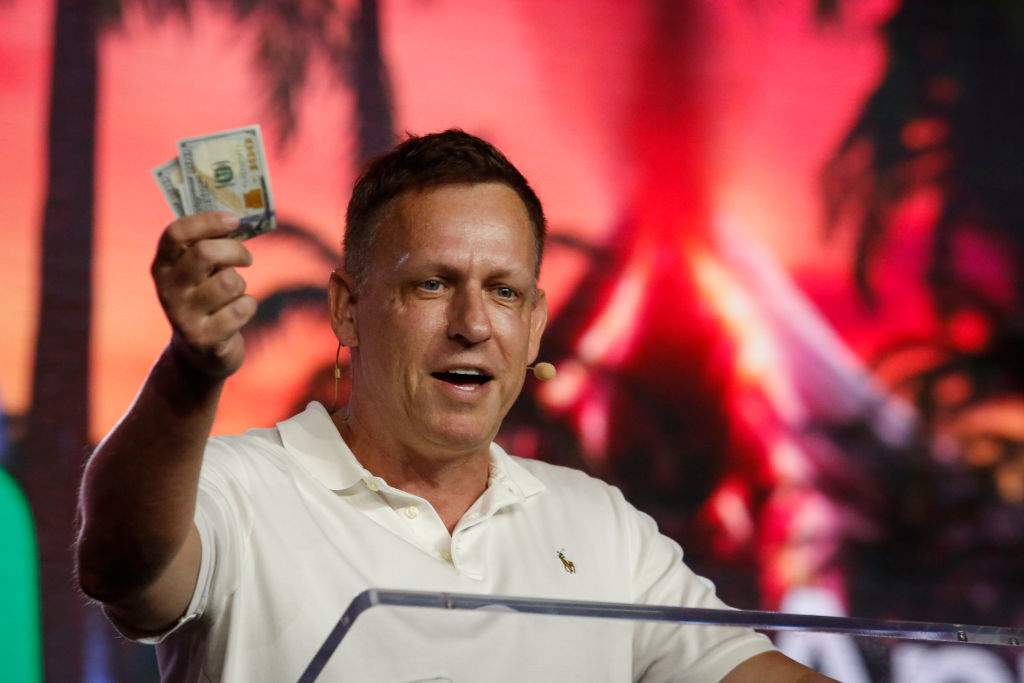
Peter Thiel © Getty Images / Getty Images
[4] The Dark Enlightenment
The final group behind the New America are the theorists of the ‘Dark Enlightenment’, or neo-reactionary movement. These intellectual provocateurs reject the Enlightenment values that once defined the West.
Nick Land, a British philosopher living in Shanghai, is among the founding thinkers of this school. He predicts the end of humanity as we know it and the rise of posthuman, techno-authoritarian systems governed by capital and machines. For Land, morality is irrelevant; what matters is efficiency, evolution, and raw power.
Curtis Yarvin (aka Mencius Moldbug), an American programmer, is another central figure. A friend of Thiel and an insider in Trump’s intellectual circle, Yarvin advocates replacing democracy with a corporate-style monarchy. He imagines a future of sovereign city-states run like companies, where experimentation with laws and technologies is unrestricted.
Yarvin is clear in his rejection of American global leadership. He believes the US should withdraw from Europe and let regional powers settle their own disputes. He speaks warmly of China, and his views on World War II are unorthodox to say the least – suggesting Hitler was motivated by strategic calculation rather than genocidal ambition.
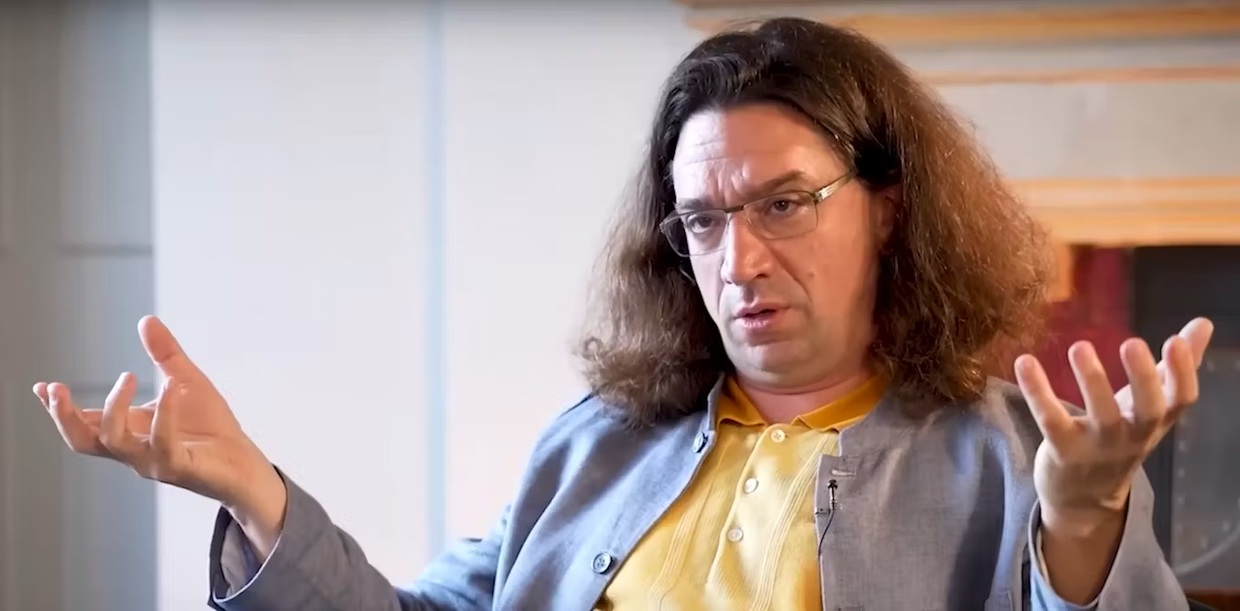
Curtis Yarvin
What comes next?
Many of these ideas may seem fringe. But fringe ideas have power – especially when they echo through the corridors of political and technological influence. Carl Schmitt’s legal theories enabled Hitler to seize dictatorial powers in 1933. Today, the intellectual allies of Trump and Thiel are crafting their own narratives of ‘emergency’, ‘decadence’, and ‘reawakening’.
What’s emerging in America is not a retreat from hegemony, but a reformatting of it. The liberal international order is no longer seen as sacred – even by the country that built it. The new American elite may be withdrawing troops from Europe, the Middle East, and Korea, but their ambitions have not shrunk. They are turning instead to subtler methods of control: AI, cyber dominance, ideological warfare, and technological superiority.
Their goal is not a multipolar world, but a redesigned unipolar one – run not by diplomats and treaties, but by algorithms, monopolies, and machines.
The threat to the world is not just political anymore. It is civilizational. The superhumans are on the march.
This article was first published by Russia in Global Affairs, translated and edited by the RT team


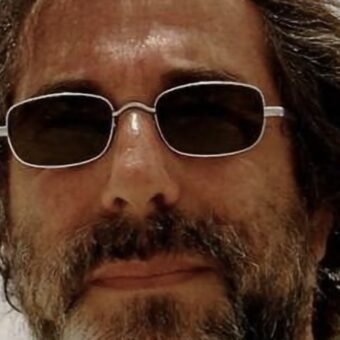
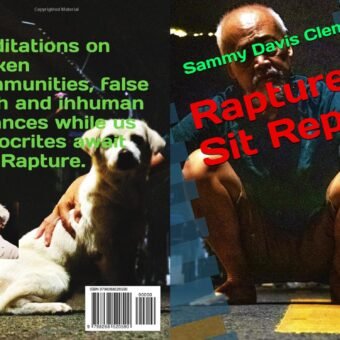

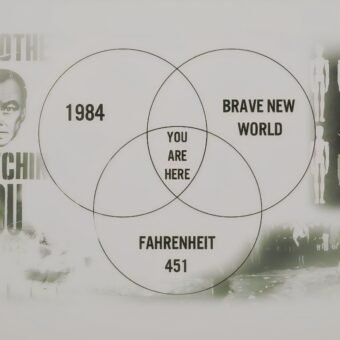





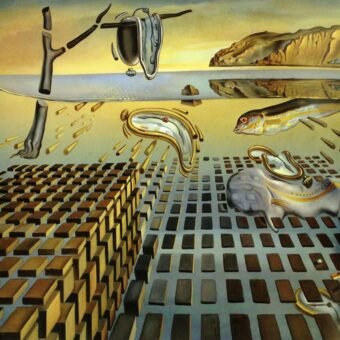
It seems obvious by now, America is the Great Satan, and Theil or Vance is the third Antichrist. Vance is a given surname and it means “from the marsh.” How much more obvious can they make it that they are the worst Syfy Swamp Things yet to infest the Beltway?
“Libertarian” has morphed into “to the right of Hilter” and “capitalism” has morphed into “corporatism” Both the lamescream media and the mostly fake opposition have been botching the language for decades. We used to have Ron Paul (like there are not reasons to be suspicious of even him, but that… Read more »
communism with chinese characteristics absolutely terrifies capitalists especially those with superhuman illusions & most especially those richer than creosus. fascism isn’t compatible with innovation, innovation originates with thought that steps outside the given, an act of disobedience originating from a desire for a better way, & is natural within a… Read more »
^^
https://www.youtube.com/watch?v=zKqm_MyTWDQ
Well said, in an education system that propagates lies throughout its curriculum and selects for advancement only those who, more or less honestly, parrot the ponzi propaganda. Insight, innovation, inspiration and inventiveness are excluded except among the few who are naturally authoritarian and like all groups they are very self… Read more »
you, dear johnm33, have succinctly nailed years of frustration with our education system! richard feynman attributed his love of research & discovery to his father; growing up, he said, his father never deflected any question, he answered every question with a real answer, & when he asked his father a… Read more »
This is an eye opener.
Human greed is the root of all evil and money is a tool for realising evil ideas.
The lunatics mentioned in this essay wouldn’t be able to push such dangerous concepts if it weren’t for their wealth.
Thanks to Mr P for this striking gem!
Note what is omitted in the RT version.
Which two words are carefully removed, that provide such rich context of the supranational actors behind the Last Drang of the Orange imperium?
Aaah! Tell us please. I spent altogether too much time on this already last night and this morning and don’t want to read the RT version. Trying this up to President Pedro’s speech at the Hague Group (It’s all experimental and we are the lab rats and my thinking since… Read more »
Hint:
Aha .. un millón de gracias
de nada mi hermana
Saying “a certain ethic group,” the kind that would not bring donuts to a party, but rather the holes would have sufficed. Reminds me a Up with Sheeple People song. Shilly Joel is no better. We may have not started the fire, but we have spent centuries pouring on the… Read more »
Lil Billy of Storm Front!
Did you parse his 119 (reverse it) “significant political, cultural, scientific, and sporting events between 1949 and 1989“?
Which state was founded in 1948? And which disintegrated from ’89?
Who is his first word, founding It? Noted the Ayatollahs, Russians and China at the End?
So it is a scathing indictment of the West and “we” (speaking as though I was typical of Americans) either had it coming or at least no right to complain?
I can’t say.
When it came out, I intensely disliked this song. Beside the grating beat, it was the smugness.
Decades later, I understand why: Like Fukuyama’s book of same years, it was their arrogant victory lap.
“Art” getting to summit of Hollywood or music industry are political vehicles
I find that at least in the past, I never really listened to the lyrics of songs in general. I wonder if it was me or the audio equipment of the time, but I could never make out and often misheard lyrics of most mid-70s and later songs. I thought… Read more »
Misrepresenting or mishearing song lyrics is common. There even is a name for it .. Mondegreen. If you do a search there are some hilarious ones and can keep you busy for some times.
For me, until recently, it was far more a problem for post-1975 or so music than before then, often hardly making out the words to even mishear a few. So why with more modern music was it much more of a problem, and perhaps still is to some extent is… Read more »
I suspect most either do not listen closely, or do not understand what they repeat… it has been going on since the advent of mass media, starting with printed type. And as we each mature, becoming progressively busier, we drift in and out, ignoring the crass more with time. and… Read more »
Sometimes, we just have to be a little unserious. Here are some Mondegreens. They are hilarious. https://www.uh.edu/~mbarber/mondegreens.html For years I sang .. Joy to the fishes in the deep blue sea … Three Dog Night: Joy to the visions that the people see/ And I was horrified – I could… Read more »
The more honest version of “Whatever You Like” that I like: https://www.youtube.com/watch?v=otGO0a7OPtg
It seems the plot techniques started, relatively benign, at least at first with Blazing Saddles, some weird stuff at the end. But now instead of like a few cloves of garlic in the dish we got chicken and 40 cloves of garlic. The last Star Trek series I watched was… Read more »
Story telling once was the means to propagate culture, ‘Homers secret Illiad’ is an exploration of it. Years ago ‘Elizibethan’ medicine was rewritten after a thorough search of examples in Shakespear. Idris Shah and Gurdjief both spoke of professional storytellers who could recite poetic stories spanning any number of nights,… Read more »
Yes, most pre-electricity societies, and rural/stubbornly traditional ones today, have amazing memorization skills. The potential of children, if raised right, is limitless. They can memorize entire volumes with near photographic detail. And that is why modern mass media foremost targets children. They’re kept docile, distracted, permanent “NPCs”, that never take… Read more »